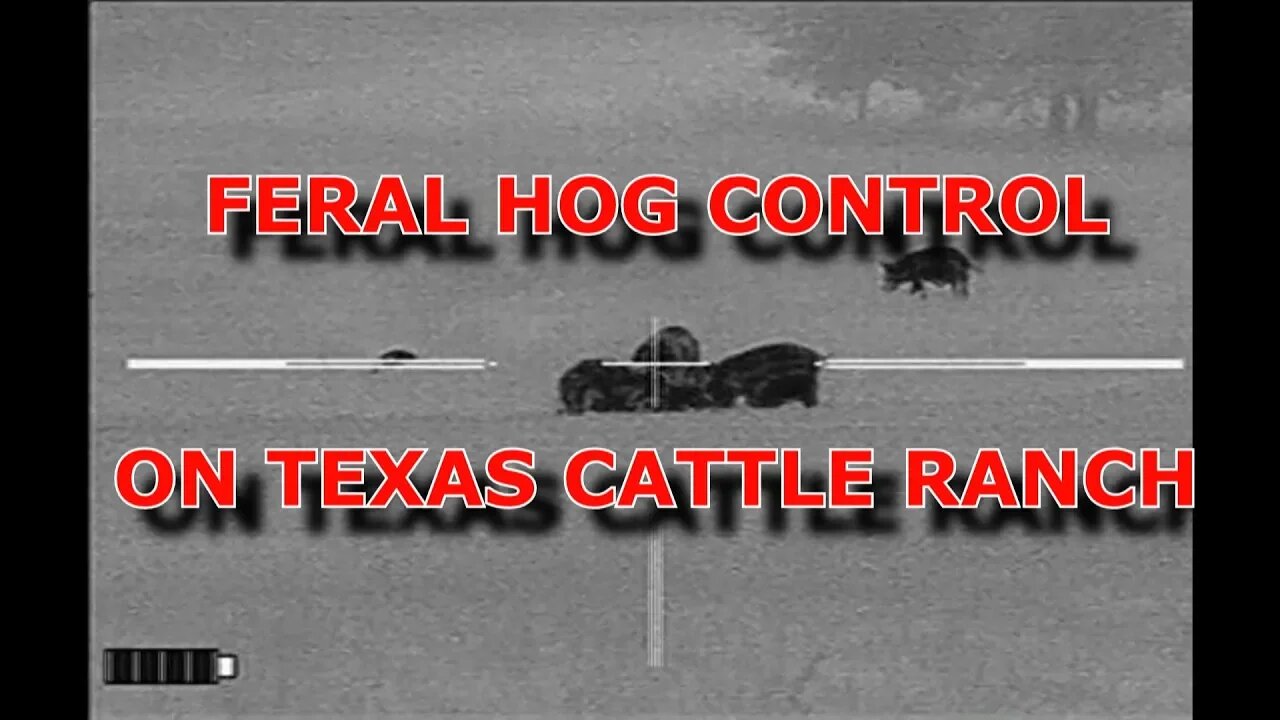Premium Only Content

Feral Hog control on Texas Cattle ranch.
Thermal and Night vision provided by http://www.hueyoutdoors.com/
Helping http://mountpleasantbeef.com/ keep the feral hogs under control, preventing them from spreading disease to the livestock and contaminating the water supply.
Feral hogs are not considered game animals in Texas and may be hunted by any means or methods at any time of year. Thermal and night vision being some of the most effective means. https://tpwd.texas.gov/huntwild/wild/nuisance/feral_hogs/
Feral swine compete with native wildlife for multiple resources, specifically food, habitat, and water. Feral swine diets overlap with those of native wildlife, such as bear, deer, and turkey, which results in competition for important and limited natural food supplies. Feral swine activity will often deter other species from living in an area, resulting in competition over prime habitat. Feral swine wallow in mud to maintain proper body temperature which can be particularly problematic during dry seasons when they monopolize and contaminate limited water sources.
Feral swine also prey directly on the nests, eggs, and young of native ground nesting birds and reptiles, including threatened or endangered species. Game birds such as wild turkeys, grouse, and quail can also be impacted. Feral swine have even been documented killing and eating deer fawns, and actively hunting small mammals, frogs, lizards, and snakes.
Feral swine wallows are prime mosquito habitat which contributes to the prevalence of various mosquito-borne diseases. Wallows can also be a place of transmission for bacteria and parasites from feral swine to native wildlife that come to drink. https://www.aphis.usda.gov/aphis/ourfocus/wildlifedamage/operational-activities/feral-swine/feral-swine-daral_hogs/mage/feral-swine-natural-resource-damage
-
 LIVE
LIVE
Sarah Westall
42 minutes agoHidden Tech Resembles Star Trek: Malaysian Airline, Portals & Wormholes w/ Ashton Forbes
298 watching -
 53:29
53:29
Professor Nez
4 hours ago🚨🇺🇸 President Trump MAKES HISTORY! The REAL Story of His First 100 Days!
20.5K66 -
 17:01
17:01
DeVory Darkins
21 hours ago $36.87 earnedDemocrats HUMILIATE AOC as Trump drops bombshell order
49.5K133 -
 LIVE
LIVE
Amish Zaku
2 hours agoRumble Spartans "The One Year" Event
122 watching -
 LIVE
LIVE
OhHiMark1776
2 hours ago🟢04-27-25 ||||| Halo Multiplayer Rumble: No. 13 ||||| Halo MCC (2019)
119 watching -
 15:05
15:05
Stephen Gardner
23 hours ago🔥BREAKING: Trump HAMMERS Zelensky after Kicking France's Macron from meeting about Ukraine!
74.2K287 -
 9:20
9:20
Tactical Advisor
1 day agoNew Shadow 2 Carry | CZ Compact Upgrade (FIRST LOOK)
68.9K19 -
 LIVE
LIVE
AlphaZeroOmega
3 hours agoHalo Rumble Spartans #13 ONE YEAR of CONQUEST celebration | 🚨RumbleTakeover🚨
63 watching -
 7:55
7:55
Talk Nerdy Sports - The Ultimate Sports Betting Podcast
7 hours ago4/27/25 - Sunday Service: Vasil’s 10 Holy Locks & PrizePicks Resurrection 💥🧠
49K2 -
 18:15
18:15
World2Briggs
15 hours ago $17.73 earned10 Cities That Are Slowly Emptying Like a Sad Party
69.3K52